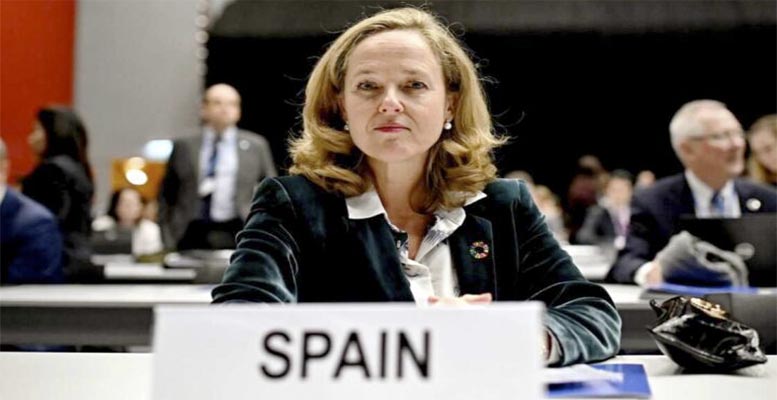Joan Tapia (Barcelona) | The figures of the Spanish economy were terrible in the second quarter. GDP plummeted by an outrageous 18.5% compared to the previous quarter, while the GDP of the euro area, despite suffering the biggest fall since reliable statistics have been available, fell considerably less, by 11.8%. And the loss of jobs in the same period was 7.5% in Spain compared to 2.9% in Europe. In July, although we were worried, we were hopeful. Spain, which had had one of the strictest lockdowns, is a tourist country that logically suffered more from the brutal fall in international mobility and travel. Summer would bring a slight recovery in activity and tourism and the prospects for autumn would be better. But, in August, the second wave of the pandemic shattered these hopes and made many countries advise against travelling to Spain, which dealt a serious blow to our tourism industry and recovery.
In the fourteen days prior to September 10, the number of Spanish people infected by Covid-19 per 100,000 inhabitants was 260, more than twice the number in France, the second most affected country in the EU, and eight times the number in Italy. The Financial Times, on analysing Spain’s poor figures, put the blame on a hasty end to the lockdown and on the lack of coordination between the measures implemented by the Autonomous Communities. Fortunately, both the number of people in hospital and the number of deaths are well below those we saw during the lockdown. This is the only positive news.
Consequently, the recovery has lost strength and doesn’t follow the European trend. PMI indexes bear witness to this. A PMI above 50 represents an expansion when compared with the previous month. A PMI reading under 50 represents a contraction. Well, the European economy and the Spanish economy revived strongly in July. The PMI for the euro area reached 54.9 and the Spanish one was 52.8, also in positive territory. In August, The PMI indexes of all countries fell, but the PMI of the euro area continues in positive territory (51.9) while the Spanish one was 48.4 and went into contraction territory. In the past, tourism helped to ease crises. Now, it is making this one worse.
The shortcomings of the political system
Until 2019, Spain was one of the fastest growing countries in Europe, now we are at the bottom of the pile. In conclusion, the summer is being worse than expected and the autumn is expected to be even more complicated. And not only because of the economic data but also because of the current shortcomings of the political system. Would it be too much to ask for politicians to be able to reach some sort of consensus to overcome the most difficult time we have had since the civil war in1936 now in the distant past?
But this sort or consensus will be difficult if not impossible. The PP, the second largest party, which should represent the interests of part of the economic right, not only refuses to negotiate the budget (to negotiate is not to approve but to show some willingness to help), but also refuses to renew, as it is required by law, the General Council of the Judiciary, which should have been renewed two years ago, and one third of the Constitutional Court of Justice (four of its twelve judges).
Why then does the PP refuse to renew such important constitutional bodies? Does Pablo Casado believe that the priority at this time is to overthrow the government of Pedro Sánchez, despite the fact that, in this Parliament, there is no other possible president than Sánchez? Would another early general election, with the period of paralysis it would entail, be the solution to our ills?
There is still the question of a political agreement To call for a grand coalition like the one that is producing such excellent results in Germany would be a chimera. But without a minimum agreement between the two big parties it will be very difficult to overcome the difficult autumn and winter we have ahead; especially as the government does not have an operational majority in Las Cortes, and it is not sure it will manage to have its budget approved. Can we face the coming months with Cristobal Montoro’s (PP) 2018 budget still in effect? Obviously not, and the failure to have a new budget approved will damage Spain’s reputation, which is essential if we want to be respected in a very turbulent world. And we are not America, despite Trump, nor Great Britain, despite Boris Johnson. We are smaller and we need to make fewer mistakes.
But not everything is negative. Fortunately, I can end this sad chronicle on an optimistic note. Spain has the capacity to resist and pull itself together. The most important piece of good news is that the dialogue among the government, employers and trade unions has not broken down, but continues despite many conflicting interests on such sensitive issues like the extension of the furlough scheme or the negotiation of the labour market reform. In the financial and business world, there are initiatives that indicate that there is hope, too. An example is the almost certain merger between Caixabank and Bankia, which will result in a stronger Spanish bank, better able to face the new challenges brought about by the coronavirus pandemic and by a long period of low interest rates. Now, to have a new budget for the difficult year we have ahead, approved by whatever parliamentary majority, is the major hurdle we have to overcome.





